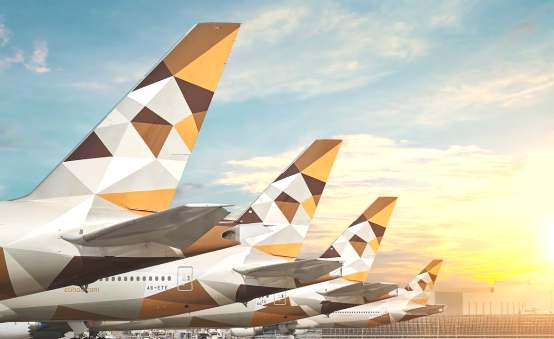Q&A with Martin Drew, SVP Sales and Cargo, Etihad Aviation Group
How has the pandemic impacted the Cargo industry in the Middle East?
With commercial aviation largely tarmacked by the pandemic, there was an overnight capacity impact on trade and cargo movements. On a national level, the UAE government prioritized food security and the ongoing supply of vital food products, as well as huge supplies of PPE, medical and vaccines. As the national carrier, Etihad Cargo played our part in the safe and timely supply of vital and essential cargo from an array of source markets, often putting economic factors aside to operate cargo-only passenger aircraft – often costlier and with limited space, depending on the type of aircraft.
The reduction of passenger flights continues to heavily impact available global capacity and remains a key consideration in constant adjustments to our routes. Providing the required airlift where our customers need it most remains our goal and, to support our customers, we reconfigured five 777-300ERs to enable cabin loading, which provided additional capacity across key routes, largely in Asia.
During the past 12 months, cargo operations have been lifeline of the Etihad group. The agility to adapt our schedules, optimize both our freighter and charter services, and work closely with our partners and customers has ensured we have provided vital support across the globe at a time when our customers have faced challenges.
Have industry players been quick to adapt technology to cater to the changing needs in the market?
Air cargo is traditionally known to be lagging in technology and those carriers unprepared for this new era have found it difficult to survive the current situation. The whole industry needs to adapt to new technologies which enable operational agility.
In 2018, we embarked on a strategy that saw an introduction of several transformation programs across Etihad Cargos’ fleet and network, commercial and operational processes, and its physical and digital infrastructures. This resulted in the carrier’s successful front-end systems migration to the market leading IBS iCargo solution in October 2018 and celebrated the launch of its Online Booking Portal www.etihadcargo.com.
We continued to work with our partners and invest in digital advancements to not only enhance our own internal operations, but also streamline our customer experiences. One of our latest advancements has been the new booking platform which provides an improved booking flow to decrease the amount of time spent on bookings. We are also working on various connectivity partnerships allowing all processes to be increasingly smooth and digital.
Etihad Cargo escalated the investment in establishing market-leading digital solutions from 2018, providing an advantage for our clients and internal operations, especially during the pandemic with so many customers across the globe working from home. A key focus of this development has been with the introduction of our online booking platform and collaborating with third parties to provide additional convenience to the customer booking experience. We have also minimized the need for paper air waybills and physical transactions thanks to major investments aimed at increased electronic air waybill penetration.
In which areas and geographies do you see strongest potential for growth?
Air freight demand remains robust and is currently above pre-COVID-19 levels. We anticipate demand remaining high in the short-term due to the challenging demand-supply dynamic. Asia is still the largest market for growth, which has witnessed significant demand driven largely by B2C purchasing trends. From a customer segment perspective, the pandemic has fast-tracked e-commerce growth which will continue to fuel cargo demand in months ahead.
What technologies do you predict will impact the Cargo industry most in the next five years?
We believe that in light of technological advancements, cargo and the way we view air transport will continue to evolve during the next five years. We are likely to witness the “uberisation of the air cargo industry” as the rise of digital solutions reduces costs, increases efficiency, increases flexibility, and enables greater speed and scale, which in turn will foster innovation. without precedents.
An intelligent cargo ecosystem of agile applications can combine data insight, automation, and connectivity to enhance intelligent ways of transporting cargo around the world to improve efficiencies. While it is considered that cargo has been slow to embrace technological change, that change is now happening and we will soon see the increasing integration and digitization of the air cargo industry.
The utilization of drones in cargo is something that is picking up pace. The introduction of drones for last-mile requirements provides an innovative solution for the delivery of time and temperature sensitive shipments. In fact, according to a survey from Pharma.Aero and Humanitarian Logistics Association, more than half (58.3 percent) anticipate drone deployment within their organization in one to five years.
What are your expectations from Dubai Airshow 2021 – which will be the first of its kind event since the Coronavirus outbreak?
Major air shows and global conferences retain tremendous value to the industry at large and this year’s Dubai Airshow will take on even greater significance because of its timing.
By the end of the year, we expect more international air corridors to have opened and the global vaccination program to be at an advanced stage – these factors will foster significant increases in air travel.
Dubai Airshow is an opportunity for the global aviation industry to meet at a live, in-person event for the first time in almost two years. We are planning to connect with existing partners and look forward to collaborative discussions with potential partners.
 What are Etihad Cargo plans ahead in the region?
What are Etihad Cargo plans ahead in the region?
Our fundamental priority is to keep our customers at the core of everything we do; it is our mission to provide positive experiences and build long-term relations. Our future plans revolve around new products, services and capabilities, while other business developments will be revealed closer to the event.
With the rise in ecommerce demand, how to you plan to manage long term capacity growth?
E-commerce demand appears destined to grow and carriers must continue adapting networks and schedules to manage volume. At a macro industry level, we predict increased preferences for reshoring or near-shoring supply chains to build resilience and agility amid potential turmoil – be that a pandemic, or geo-political in nature. It’s a question of reducing risk, and we see valuable collaborations with e-commerce players coming into effect to mitigate risk wherever possible.
In terms of volumes during the pandemic, we saw a significant increase in courier levels to service vital commodity supplies during 2020. We’ve seen significant increases of exports from the UK, and we’ve also seen a lot of shipments inbound from the far East into the UK and Ireland. With Etihad Cargo operating from a strategic geographic hub between these monolithic markets of East and West, we are well-placed to service ever-growing e-commerce demand.
How can the cargo industry reduce its C02 impact while keeping up with the next day delivery culture?
The development of liquid biofuels provides a viable low-CO2 alternative to kerosene. In 2019, Etihad operated its first commercial flight using locally produced sustainable fuel. This heralds the way for increased research and development in this area and we continue to explore potential solutions across our fleets.
Etihad Cargo is committed to being Greener Together, a simple statement expressing our pledge to minimize environmental impact by integrating sustainable day-to-day operations. We expanded our ULD fleet from 3,000 units in 2012 to 4,700 in 2021, establishing innovative solutions to support the company’s sustainability zero-carbon target.
We also introduced Lightweight ULDs – which are 20kg lighter than their aluminium counterparts – resulting in reduced fuel consumption. The move contributed to a total weight reduction of 830 tons per month on wide-bodied flights, and reduced carbon emission by approximately 444 tons.
Editor’s Note:Interview and photo courtesy of Dubai Airshow, one of the world’s biggest aerospace events, showcasing the most innovative aviation products and solutions, exciting static displays and a host ofother features and thought leadership conferences. Air Cargo Update and Aviation Guide are proud media partners of this mega event which attracted participants from 148 countries in 2019.
Etihad Cargo is sponsoring the event’s Cargo Connectexhibition.The UAE’s national airfreight carrier offer customers access to a large network of chartered and scheduled services worldwide. Its special products and services include SkyStables (Equine), LiveAnimals, TempCheck (IATA CEIV Pharma), FreshForward (IATA CEIV Fresh), FlightValet (Automobile), SafeGuard and FlyCulture (Vulnerables).
Etihad Cargo is a founding partner in HOPE Consortium, the Abu Dhabi-led alliance of public and private sectors to address COVID 19 vaccine logistics and facilitate vaccine availability across the world.
Capping this year’s most anticipated global aviation event is the Dubai Airshow Gala Dinner hosted by Dubai Airports with performances from spectacular list of artists, including Jennifer Lopez, Sir Tom Jones, Diana Ross, Stevie Wonder, Katy Perry, OneRepublic and many more. For more info, visit www.dubaiairshow.aero.










